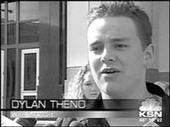Court finds student was run out of school for not conforming
BY ARTHUR S. LEONARD
Chief Judge John W. Lungstrum of the U.S. District Court for Kansas has affirmed a jury verdict for $250,000 in damages in favor of Dylan J. Theno, who was subjected to such severe and pervasive homophobic harassment that he dropped out of high school. Ruling on October 18, Lungstrum rejected a post-trial motion by the Tonganoxie Unified School District to set aside the jury verdict.
Lungstrum had previously rejected the school district’s pre-trial motion for summary judgment on June 24, as well as a subsequent motion for reconsideration by the school district.
Theno’s claim was that the school district had violated Title IX of the Education Amendments Act of 1972, which prohibits sex discrimination by schools that receive federal funding, by demonstrating deliberate indifference to the severe and pervasive gender-based harassment that he suffered at the hands of fellow students.
The opinions in the case do not specify Theno’s sexual orientation, although his case was similar to many cases involving gay students. According to Lungstrum’s account of the evidence, classmates began to harass Theno in the seventh grade, and the pattern of harassing comments, gestures, and name-calling accelerated through eleventh grade, leading him to drop out of school. Even though Theno’s father visited school administrators in an attempt to get them to address the issue, no effective action was taken.
Theno was characterized in the evidence as a non-conformist in several respects. He wore an earring and styled his hair differently from the other teenage boys in his small, rural Kansas high school. Although he played football briefly in the seventh grade, he dropped out after a knee injury, leading fellow students to call him a “flamer” and a “faggot.” Despite this pressure, he did not participate in other team sports, preferring to concentrate on his passion for Tae Kwan Do, a Korean style of karate, for which he earned medals. Another student started a false rumor that Theno had been caught masturbating by a teacher in the bathroom, and the rumor dogged him for the rest of his time as a student.
In fact, trips to the bathroom became intensely stressful for Theno, as students would call him names and peer over the top of restroom stalls, ostensibly to make sure he was not masturbating. Theno suffered sustained ridicule in the student lunchroom, with one boy in particular making demonstrative use of a banana to illustrate his shouted claims that “Dylan likes men” and “Dylan sucks cock.” Students would regularly spit on the walls and then shout that Theno had just passed by.
Though much of the harassment took place in the presence of teachers, they did punish the guilty parties, instead sometimes laughing along with them. In some cases, Theno was provoked into fighting back physically, and was several times subjected to more onerous punishment than his persecutors. According to medical testimony at trial, Theno suffered psychological and physical symptoms as a result of the harassment, until he felt compelled to drop out of school.
Lungstrum instructed the jury that it could rule in favor of Theno only if it concluded that he had proved that the harassment was due to his gender, that it was severe and pervasive enough to create a hostile environment that deprived him of equal educational opportunity, and that school administrators were aware of the problem and failed to make any meaningful attempt to deal with it. Lungstrum specifically embraced the “gender stereotyping” theory that has been developed by federal courts in workplace cases under the Civil Rights Act of 1964, under which a person harassed for failing to conform to stereotypical gender roles has suffered sex discrimination.
The jury concluded for Theno on all points.
In its post-trial motion, the school district argued that the evidence did not support Theno’s claims, contending that he was being harassed for being different, not because of his gender. The school district argued that in this context being called a “faggot” and a “pussy” was no different from being called a “geek” or a “spaz,” and did not evidence gender stereotyping. Such language is common among teenage boys, the district contended.
After summarizing the evidence in detail, Lungstrum concluded, “in this case, the harassment of plaintiff was pervasively comprised of crude sexual gestures, innuendos, teasing, and name calling. All of this contributed to a sexually-charged hostile environment that appeared to have been motivated by his peers’ belief that he failed to conform to stereotypical gender expectations for a teenage boy in their community. Motivated by his failure to conform to those expectations, they used his sexuality to denigrate his masculinity.”
gaycitynews.com



































